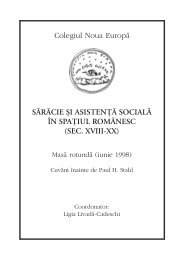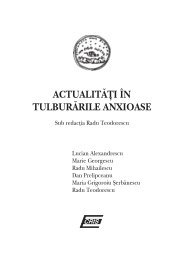New Europe College Regional Program Yearbook 2001-2002
New Europe College Regional Program Yearbook 2001-2002
New Europe College Regional Program Yearbook 2001-2002
You also want an ePaper? Increase the reach of your titles
YUMPU automatically turns print PDFs into web optimized ePapers that Google loves.
N.E.C. <strong>Yearbook</strong> <strong>2001</strong>-<strong>2002</strong><br />
94 As Gellner argued in his replies to critics, the passion of nationalism is very<br />
present in his theory: “the passion is not a means to a particular end, it is a<br />
reaction to an intolerable situation, to a constant jarring in the activity which<br />
is by far the most important thing in life – contact and communication with<br />
fellow human beings”, Gellner, Reply to Critics, quoted in John Hall, (ed,)<br />
op. cit., p. 12.<br />
95 Brendan O’Leary, op. cit., p. 43.<br />
96 Taylor, Nationalism and Modernity, p. 45.<br />
97 Op. cit., p. 44.<br />
98 Op. cit., p. 45.<br />
99 Different national identities can become a “tribal stigma”. Sorin Antohi<br />
describes the devastating consequences of becoming aware of the stigma in<br />
Romanian space in the chapter “Cioran and the Romanian Stigma. Identitary<br />
Mechanism and Radical Definitions of Identity”, in Civitas Imaginalis, p.<br />
208.<br />
100 Communication between Basarabian intellectuals and their Romanian<br />
“brothers” was possible in an indirect way: through the libraries and<br />
bookshops of Moscow and St. Petersburg.<br />
101 Gellner, Nations and Nationalism, pp. 92-98.<br />
102 Michael Ignatieff, “Nationalism and Toleration”, in <strong>Europe</strong>’s <strong>New</strong> Nationalism,<br />
State and Minorities in Conflict, (eds.,) Richard Caplan&John Feffer, Oxford<br />
University Press, 1996, pp. 212-231, p. 225.<br />
103 Ignatieff, op. cit., p. 213.<br />
104 Charles Taylor, in The Ethnics of Authenticity, Harvard University Press,<br />
1991, analyses the need for authenticity in nationalist struggle, as well as in<br />
multicultural movements of the contemporary world.<br />
105 Klaus Heitmann, Limbã ºi politicã în Republica Moldova, Chiºinãu, ARC,<br />
1998, p. 141.<br />
106 Due to the linguistic inferiority, being Moldovan became a kind of stigma.<br />
According to psychological approaches stated by the book of Erving<br />
Goffman, Stigma: Notes on the Management of Spoiled Identity, stigma is<br />
produced when somebody accepts the perspective of the other over his<br />
own identity and this leads to shame, humility, self-hate. Of course, one<br />
condition for the appearance of tribal stigma was the meeting of Moldovans<br />
with Romanians. Usually, being in Romania, Moldovans try to hide the<br />
linguistic difference, particularly the phonetic differences that are considered<br />
ridiculous. But now there is stigma even among Moldovans. Moldovans,<br />
who speak their native language “correctly”, fluently, without stuttering,<br />
consider ridiculous those who still speak the archaic dialect.<br />
107 For an explanation of the case of Hebrew and Norwegian languages see<br />
Language and Nationalism in <strong>Europe</strong>, (ed.) Stephen Barbour & Cathie<br />
Carmichael, Oxford University Press, 2000, and Thiesse Anne-Marrie,<br />
Crearea identitãþilor naþionale în Europa, secolele XVIII-XX, traducere A.<br />
68







